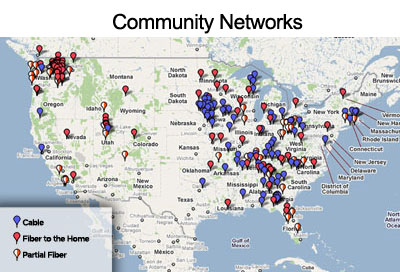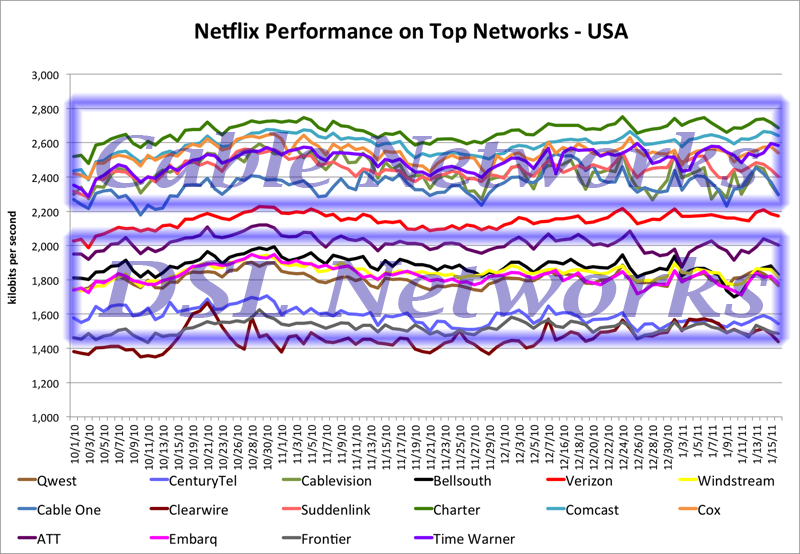
Fast, affordable Internet access for all.

 As you read this, remember that the FCC's National Broadband Plan largely places the future of Internet access in the hands of these corporations.
As you read this, remember that the FCC's National Broadband Plan largely places the future of Internet access in the hands of these corporations.These numbers are likely to grow even starker as the 30 percent of Americans without any kind of Internet access come online. When they do, particularly if the next several years deliver subpar growth in personal income, they will probably go for the only option that is at all within their reach: wireless smartphones. A wired high-speed Internet plan might cost $100 a month; a smartphone plan might cost half that, often with a free or heavily discounted phone thrown in. The problem is that smartphone access is not a substitute for wired. The vast majority of jobs require online applications, but it is hard to type up a résumé on a hand-held device; it is hard to get a college degree from a remote location using wireless. Few people would start a business using only a wireless connection.She identifies the problem as a lack of competition in the market while highlighting the role of lobbying from the wealthy cable companies to keep it that way:
The bigger problem is the lack of competition in cable markets. Though there are several large cable companies nationwide, each dominates its own fragmented kingdom of local markets: Comcast is the only game in Philadelphia, while Time Warner dominates Cleveland. That is partly because it is so expensive to lay down the physical cables, and companies, having paid for those networks, guard them jealously, clustering their operations and spending tens of millions of dollars to lobby against laws that might oblige them to share their infrastructure.In this essay, her preferred solution is better federal regulation that would require companies that own networks to share parts of their infrastructure with competitors (to significantly reduce the problems of natural monopoly). Unfortunately, she did not explicitly discuss the solution of the communities building their own networks - a topic she has discussed at great length elsewhere in very positive terms.
A common misconception is that local governments award exclusive (or monopolistic) franchises to cable companies and that is why the US has so little cable competition. However, no local government has done this since the 1996 Telecommunications Act 1992 Cable Act made the practice illegal.
But even before the '96 Telecom Act '92 Cable Act, local governments tended to award non-exclusive contracts to cable companies because they wanted more competition, not less -- as illustrated in this article about Cox preparing to renew its franchise agreement with New Orleans.
Federal laws and Federal Communications Commission decisions also have sharply curtailed the city's negotiating ability. Even if other companies were seeking permission to provide cable to local customers, said William Aaron, a legal adviser to the council on telecommunications issues, council members could not arbitrarily refuse to renew the Cox franchise. The council could do that only on the basis of certain limited criteria, such as that the company has not lived up to the terms of the 1995 agreement. Cox has had a nonexclusive franchise to operate in Orleans Parish since 1981, meaning that other companies also can apply to provide cable services, though none has done so. The franchise was renewed in 1995.For years, state and federal policies have limited local authority to require just compensation for access to the valuable right-of-way because the cable and telephone companies pretended that they would invest more and create competition if local authority were preempted. Local authority has been significantly preempted in many communities without any real increase in competition or lowering of prices. No surprise there - another victory for companies better at lobbying than providing essential services.
“Access to the internet is akin to a civil rights issue for the 21st century,” said David Cohen, Comcast’s executive vice president. “It’s that access that enables people in poorer areas to equalize access to a quality education, quality health care and vocational opportunities.”It was only after the federal government mandated a low-cost option for disadvantaged households that Comcast realized everyone could benefit from access to the Internet. Sadly for Comcast, it has done a poor job of reaching those disadvantaged communities, by its own admission:
"Quite frankly, people in lower-income communities, mostly people of color, have such limited access to broadband than people in wealthier communities."This is why so many communities are building their own next-generation networks - they know that these networks are essential for economic development and ensuring everyone has "access to a quality education, quality health care and vocational opportunities." And they know that neither Comcast nor the federal government are going to make the necessary investments. They need a solution for the next 20 years, not just the next 2.
 Comcast has a de facto monopoly in many communities.
Comcast has a de facto monopoly in many communities.
In the process of knitting a baby blanket, a whole ball of yarn became tangled into this mess. . . .
. . . reminding me of the time, in the early eighties, when I was the second cable administrator appointed in the U.S., and found myself peering into a hole in the street filled with a similar looking mess—only made of copper wires, instead of yarn.
The Netflix Techblog has released a graph of performance by Internet Service Provider - which I modified to demonstrate the Looming cable monopoly as identified by Susan Crawford (and recently discussed here by Mitch Shapiro).

The trend is unmistakable. There are 2 distinct groupings - the cable providers all beat the DSL providers (Verizon is in the middle, likely due to its fast FiOS speeds averaging with much slower DSL connections). At the very bottom is Clear's 4G WiMax - you know, the superfast wireless that is the key to fast broadband!
Communities need to read this chart and take a lesson: the future of broadband is not pretty if you do not have a network that puts your needs first. Cable broadband speeds are increasingly more rapidly than DSL, meaning a local monopoly on high speed broadband, with DSL slowly becoming the modern dial-up.
Frontier has been bitten by the same disadvantage many communities face when building their own networks -- little market power means having to overpay for everything. When Frontier bought millions of Verizon rural lines, it bought a few FiOS connections as well. But not enough to gain any bargaining power with channel owners. So Frontier had to raise the costs of its video services up for 46%. Lest anyone feel too sorry for Frontier, they are doing just fine. It is their customers who suffer. But it is a reminder that the issue of scale and market power are barriers to all competition, not just community networks. If we want to have real competition in this country, the Congress and the FCC need to stop ignoring the problems caused by massive players distorting the market. This unregulated market is an invitation for big players to join together and screw everyone else.
The City of Seattle – and other cities and counties – can regulate cable TV to a limited extent. Therefore we can demand cable companies provide a low cost basic service – $12.55 in Seattle for Comcast, for example, and there’s even a discount to that low rate for low-income residents – more details here. The State of Washington – and other States – can regulate telephone service, and require telephone companies to provide a low cost basic phone rate, e.g. $8 a month for 167,000 households. But NO ONE regulates broadband/Internet access. Consequently ISPs can charge whatever the market will bear. So in our present monopoly or duopoly environment throughout the nation – that is little choice for most of us – prices are at $30, $40 or more for even moderate speed access. Higher speed access is $100 or more. And that means low-income, immigrant, seniors and other households cannot afford access to the Internet. So they and their children are denied what is probably the most important pathway to education, information, jobs and higher income – access to the Internet. Even middle income households or neighborhood businesses cannot get affordable truly fast (e.g. 5 megabits per second symmetric) broadband.Bill's post is well-linked and worth reading in its entirety.

Download Breaking the Broadband Monopoly [pdf]